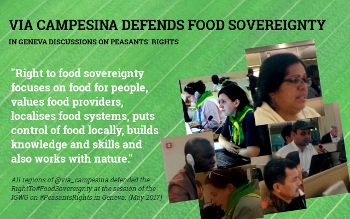La Via Campesina emphatically defends Food Sovereignty in Geneva, at the UN

Since the begging of this week in Geneva, at the Palais Des Nations – the venue for the fourth session of the working group meeting to negotiate on a UN Declaration for the rights of peasants and people working in rural areas – a delegation of La Via Campesina has been repeatedly voicing the concerns and struggles of peasant women and men worldwide.
Ever since Monday, when they checked into the UN on a tractor, representatives of the peasant movements in Asia, Africa, Americas and Europe have been presenting and proposing amendments to the latest draft of the UN Declaration.
On day three, Wednesday, they offered an emphatic defence of why realization of food sovereignty is a pre-condition for all other rights of people, pre-condition to achieve food security and the urgent need for the UN Declaration to recognize and promote it.
Speaking at the fourth session, Aleyda Aragon of ACT Nicaragua and a member of La Via Campesina said, “Food Sovereignty embodies the identity of an individual and of a community,”
Ramona Duminicioiu from Ecoruralis , Romania went onto explain why it is crucial for the world’s peasants, what differentiates food sovereignty from food security and why it crucial to strengthening local community markets;
“Food Security is about economic rights, and food sovereignty is about human rights. Peasants should have the right to define their own food and agriculture systems. Peasants should have the right to produce healthy and culturally appropriate food, through ecologically sound, socially just and sustainable methods. As we are aware of the concerns of governments about the relation between food sovereignty and the global market, this is the perfect opportunity for us to clarify one more time: food sovereignty is not against the global market. Food Sovereignty is a solution to rebuild local markets which have been deteriorated by the global market economy.” A text of her complete intervention is available here.
Valentina Hemmeler Maïga, [Uniterre, La Via Campesina –Switzerland] insisted that local agricultural systems which are capable of meeting the needs of local communities must be given an opportunity. She cited that several countries in the Global South have recognised food sovereignty in their national legislations. “Without an opening of western countries to the right to food sovereignty, just and resilient, we will not be able to meet the challenges of the future!”, she added. [Access her complete statement here]
Via Campesina launched the idea of “Food Sovereignty” at the World Food Summit in 1996. This idea has now grown into a global people’s movement carried by a large diversity of social sectors such as the urban poor, environmental and consumer groups, women associations, fisher-folks, pastoralists and many others. It is also recognized by several institutions and governments.
Henry Saragih, from Serikat Petani Indonesia and a senior leader in La Via Campesina has played a pivotal act in facilitating a bottom-up process to arrive at the UN Declaration. While speaking at the UN he emphasised on promoting food sovereignty to address hunger and malnutrition. “The international fora recognized food sovereignty especially in the World Food Summit in 2002, five years after Via Campesina launched the idea. The international community also recognised the importance of it during the UN High Level Meeting, while responding to the 2008 food crisis .” he said.
“Ever since, Food Sovereignty has been included in the constitution of some countries. In our country, Indonesia, we have Law number 18, 2012, on food—which recognises food sovereignty. Right to food sovereignty focuses on food for people, values food providers, localizes food system, puts control of food locally, builds knowledge and skills, and works with nature. I urge the working group to constructively discuss this.”, Henry said backing the interventions made by other La Via Campesina delegates.
Vincent Delobel, a goat breeder from Belgium [representing MAP & FUGEA (La Via Campesina Europe)] spoke about the precarious situation of peasants and small farmers in Europe.
“[…]the added value of what comes out of the farm has declined, the volatility of markets has increased, the bargaining power of farmers has sharply decreased. Finally, public support for farm income is still strongly related to the size of the farm, especially the number of hectares cultivated. Unfortunately, these different trends have created poverty and agricultural precariousness, including in Europe, a source of deep feeling of abandonment and social and economic injustice in our countryside. The intense pressure towards low prices is harmful to our environment and our quality of life. Indeed, most farmers are self-employed and enjoy only a low level of social protection.
Faced with this economic suffocation, we peasants, women and men, struggle to regain more autonomy (seed, forage, energy, technical etc.). We try to organize collective bargaining, to share tools, we’ve started to transform our products on the farm, to produce food of different quality (organic in particular), to feed citizens through shorter circuits … Thus, we reappropriate the activities upstream and downstream of production […]” Read his complete intervention here
For more updates on the Fourth session, click here. For visuals and videos, please follow #PeasantsRights thread on Twitter and Facebook
